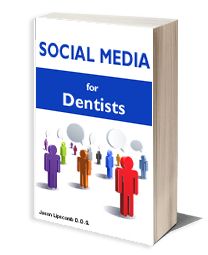 Everyone is striving to be at the top of search engines. Many Dentists think that this search engine optimization, or SEO, is only related to their website. The website is usually the main focus in a SEO campaign, but there are many built in features in social media platforms, and some newly organized features that can help an SEO campaign.
Everyone is striving to be at the top of search engines. Many Dentists think that this search engine optimization, or SEO, is only related to their website. The website is usually the main focus in a SEO campaign, but there are many built in features in social media platforms, and some newly organized features that can help an SEO campaign.
Let's think about why we want our website to place highly on search engine results. We want our material out there first, and we want it to catch the potential patient's attention. Why limit this content to just a website? What if a potential patient can find compelling content on a social media platform? What if the search engine ranking a social media profile ranks fairly high? Social Media can drive traffic back to your website, but it can also have a nice ranking itself. Here are some instances where social media and SEO cross paths.
- Vanity URLs- Many platforms allow you to create a vanity URL, i.e. http://facebook.com/yourdentalpractice. The search engines will index this information first. Changing this information will allow you to create a keyword rich URL on a very popular website. (Facebook had higher traffic than Google at the end of this year)
- YouTube- Many SEO experts love YouTube. Google loves video content (probably because Google owns YouTube) and popular videos rank very well within Google. You
- Twitter- Twitter has become the darling of the search engines lately. In November Google started to index Twitter posts (tweets). This allowed those of us who are trying to get our message out, a bit of an advantage. A keyword rich Tweet can now appear in search results. In some cases the Tweets appear higher than static content on web pages.
- Blogs- Blogs now come in all shapes and sizes, and are full of SEO goodness. Many blogging platforms like Wordpress even have a SEO widget that can be added. Much of the SEO benefit of blogs are the subject matter themselves. Blogs are often key word rich and frequently updated.
- Social bookmarking- Social Bookmarking sites like Digg seem to be widely used, but not to the extent they could be. Creating a bookmark is much like creating a little website. Every time a new bookmark is created it creates its own little web page. A bookmark also creates an inbound link to the web page or blog it is connected to. Sites like Mashable.com and Alltop.com use the most highly bookmarked material to create their content. Many journalists also troll through these sites to see what is currently popular.
- Linking within Facebook- Adding links in within Facebook posts give links a viral boost. Facebook is built on the sharing platform, and something that is cool or popular will often spread like wildfire. The sharing options are built into the platform so spreading the word about something, hopefully your link, is easy. Facebook recently changed some of its privacy policies to allow some posts to be indexed by search engines. To some this change of privacy is very upsetting, but to those who are trying to market a dental practice or anything else, this presents an opportunity. Once again keyword rich posts and links can be found by search engines, if you let them.
- Inbound linking- Social media in general presents a great way to create lots of inbound links. These are links that are directed to your website or blog. Tweets are a great way to create or show off links and drive traffic to a website. Creating links in YouTube has become easier also. No matter what the platform, having a greater number of links back to your website will always help your SEO
- Reviews- Although some would probably not consider reviews as social media, I think it is a perfect example. Where else can you have such an interaction, and get a response from a real person. Google loves reviews, and review sites. A greater number of quality reviews can really aid your SEO. Social media platforms like Facebook also have incorporated review options. Be sure to ask your patients for reviews, and make it easy for them to find. They will be far more likely to leave a review if the guess work is removed.
- Message boards- Message boards are where most social networking started. They can also be very powerful SEO tools. Many message boards are operated by major media outlets and are often indexed by search engines. Content about your practice can often show up on search engines from these message boards.
- Picture sharing- Picture sharing sites like Flickr have enabled some geotracking capabilities for uploaded pictures. This will come in handy if you have pictures of your dental practice. Flickr also allows pictures to be tagged with ........you guessed it, key word rich tags. This is a great place to place inbound links for your website, and many keywords for SEO.
Jason T. Lipscomb D.D.S. is a general dentist in Virginia. In addition to operating two busy dental practices, he educates other dentists how to market their practice with social media. Dr. Lipscomb and his partner Stephen Knight have released a social media handbook for dentists called "Social Media for Dentists".
SEO in Social Media